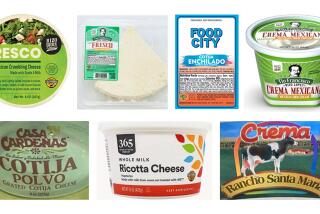Kosher market targeted in USDA probe, class-action lawsuit
- Share via
The U.S. Department of Agriculture has launched an investigation into the Doheny Glatt Kosher meat market as the controversy entered the court system.
The owner of Doheny, Michael Engelman, faces accusations of selling meat that was not properly certified under kosher rules. Last week, a council of rabbis pulled Doheny’s kosher certification and, in a statement Friday, raised the possibility of legal action.
A Los Angeles man filed a class-action lawsuit against the market and its owner Tuesday, seeking unspecified damages and alleging fraud, false advertising and other charges.
Joshua Fard, 30, of Beverly Hills has three children and said he and his family bought meat from Doheny on a quarterly basis.
“This is a deeply held religious belief that he has,” Fard’s attorney said.
On Tuesday, the USDA’s Food Safety and Inspection Service confirmed that the Doheny market is under investigation, adding yet another item to its mounting pile of problems. Officials declined to provide additional details because the investigation is ongoing.
Eric Agaki, a private investigator whose video recordings ignited the kosher meat controversy, said he met with USDA investigators March 25 and gave them materials he had collected during his own investigation.
Though the exact nature of the USDA’s investigation was not clear, Agaki said investigators told him that USDA boxes are not supposed to be repacked.
This not the first time a secular agency has stepped in during a kosher meat crisis in Los Angeles.
In 1990, Emes Kosher Meats had its kosher certificate suspended by the same council of rabbis that yanked Doheny’s. At the time, Emes was the biggest kosher retailer in Los Angeles.
The scandal forced the market to close for months, before reopening, and then closing again. In the wake of the scandal, the Rabbinical Council of California adopted toughened rules governing the eligibility of butchers for kosher certification and expanded their inspections.
County officials also stepped up their monitoring of records kept by kosher butcher shops and investigated whether the practice of mixing kosher and non-kosher meat was widespread.
Like Doheny, Emes Kosher attracted many customers because of its wide variety and low prices. In an advertisement in a Jewish weekly, Emes owner Semyon Rachshtut blamed closure of his market on “suppression received from the Rabbinical Council of California.”
More than two decades later, the current allegations have roiled Los Angeles’ Jewish community again. Some alarmed passersby ripped into the store and its owner as they walked past the reopened store on Friday. Other longtime Doheny customers returned after hearing that the market got a new kosher certification from local rabbis.
Some supporters said they believed Engelman had been set up by other distributors who grew frustrated by his success. They labeled the RCC as politically motivated.
Tuesday was the last day of Passover, and phone calls to the RCC were not immediately returned. But in an interview with The Times, Agaki flatly denied those rumors, saying his probe of Doheny Glatt Kosher meat market “felt like the right thing to do.”
“How can anybody set them up?” Agaki said of Engelman and his associates. “They did what they did. Nobody made them do it.
“Nobody hired me, nobody paid me,” he continued. “If anybody wants to pay me and send me donations, I’m glad to accept them.”
Agaki said his investigation into Doheny began about seven months ago when he was approached by a local rabbi. The rabbi told him some community members were frustrated because Doheny was selling meat “way too cheap” and “putting a lot of people out of business.”
The video recordings released to KTLA-TV Channel 5 purport to show one of Engelman’s associates loading his car with repacked glatt kosher boxes at an unsupervised warehouse in Reseda in early March. The associate transfers them to Engelman at a McDonald’s, Agaki said, and Engelman unloads the boxes at his market when the overseer is absent.
Agaki, who is Jewish, said he had no relationship with Engelman prior to the start of the investigation. But he said that during his investigation, it became clear that “a lot of distributors had problems with Doheny.”
Kosher meat is considerably more expensive than meat found in a regular supermarket because of the extra supervision and inspections required. Mixing glatt kosher meat with non-kosher meat, or even kosher meat of a lesser quality could help drive down prices if it was falsely advertised.
“A lot of people wanted to see Doheny go down,” Agaki said.
Fard’s attorney, Raymond Zolekhian, said: “He and his family keep a strictly kosher home.”
Engelman could not be reached for comment Friday when The Times visited the market.
ALSO:
President Obama decides not to endorse in L.A. mayoral runoff
Jury selection begins in Michael Jackson wrongful death AEG trial
Private investigator denies setting up owner of kosher meat market
More to Read
Sign up for Essential California
The most important California stories and recommendations in your inbox every morning.
You may occasionally receive promotional content from the Los Angeles Times.











